Traditional machine learning education costs thousands of dollars and takes years to complete. This curated collection of 20+ free machine learning courses from Stanford, MIT, Coursera, edX, and specialized ML platforms delivers the same foundational knowledge and practical skills without the financial barrier.

These carefully selected free ML courses cover everything from fundamental concepts and core algorithms to hands-on projects and real-world applications. You’ll master industry-standard tools like Python and TensorFlow, work with actual datasets, and build a portfolio of ML projects that showcase your abilities to potential employers.
What are Free Machine Learning Courses?
Free courses provide access to educational content without upfront payment, though they vary in what’s included. Understanding the different types can help you choose the right option for your learning goals.
Fully Free Courses: These rare gems offer complete access to all materials and often include certificates at no cost. They’re typically provided by organizations, open-source communities, or educational initiatives.
Audit-Only Courses: Most major platforms like Coursera and edX allow you to audit course materials, including videos, readings, and lecture notes, for free. However, graded assignments, peer feedback, and certificates require payment. Pro tip: On Coursera, look for the “Audit” option on individual course pages rather than Specialization landing pages, where it’s often hidden.
University Open Courseware: These offerings from institutions like MIT and Stanford provide comprehensive access to lectures, notes, problem sets, and sometimes even recorded class sessions, all completely free. The main limitation is that they typically don’t offer certificates or instructor interaction.
Freemium Models: Some platforms offer basic content for free with premium features (advanced modules, mentorship, career services), available for a fee.
20+ Best Free Machine Learning Courses Comparison Table
| Course | Provider | Difficulty | Duration | Certificate | Platform | Access Type |
|---|---|---|---|---|---|---|
| ML Zoomcamp | DataTalks.Club | Beginner-Intermediate | 4 months | Free (cohort only) | DataTalks.Club | Fully Free |
| Google ML Crash Course | Beginner-Intermediate | Self-paced | No | Google Developers | Fully Free | |
| ML for Beginners | Microsoft | Beginner | 12 weeks | No | GitHub | Fully Free |
| ML with Python | IBM | Intermediate | 2 weeks | Audit free, paid certificate | Coursera | Audit-Only |
| ML Specialization | DeepLearning.AI | Beginner | 2 months | Audit free, paid certificate | Coursera | Audit-Only |
| Statistical Learning with Python | Stanford | Introductory | 11 weeks | Audit free, paid certificate | edX | Audit-Only |
| ML with Python: Linear to Deep Learning | MIT | Intermediate-Advanced | 15 weeks | Audit free, paid certificate | edX | Audit-Only |
| Data Science: Machine Learning | Harvard | Introductory | 8 weeks | Audit free, paid certificate | edX | Audit-Only |
| CS229 Machine Learning | Stanford | Intermediate-Advanced | Summer 2025 | No | Stanford | University OCW |
| CS189/289A | UC Berkeley | Intermediate-Advanced | 16 weeks | No | UC Berkeley | University OCW |
| Introduction to ML (6.036) | MIT | Intermediate | 13 weeks | No | MIT OCW | University OCW |
| Learning from Data (CS156) | Caltech | Introductory-Intermediate | 18 lectures | No | Caltech | University OCW |
| Machine Learning (10-601) | Carnegie Mellon | Intermediate-Advanced | 16 weeks | No | CMU | University OCW |
| Mathematics for ML Specialization | Imperial College | Foundational-Intermediate | 12-18 weeks | Audit free, paid certificate | Coursera | Audit-Only |
| ML with Python | FreeCodeCamp | Intermediate | Self-paced | Free certification | freeCodeCamp | Fully Free |
| Practical Deep Learning for Coders | Fast.ai | Beginner-friendly | ~13.5 hours | No | fast.ai | Fully Free |
| Kaggle ML Courses | Kaggle | Beginner-Intermediate | Few hours each | Free completion cert | Kaggle | Fully Free |
| ML in Python with scikit-learn | Inria | Intermediate | 36 hours | Open Badge | FUN MOOC | Fully Free |
| Fundamentals of ML and AI | AWS | Beginner | 1 hour | Audit free, paid certificate | Coursera | Audit-Only |
| Introduction to Machine Learning | Duke | Intermediate | 3 weeks | Audit free, paid certificate | Coursera | Audit-Only |
How to Choose the Right ML Course for You
With 20+ free online machine learning courses available, choosing the right one can feel overwhelming. This section will help you match your goals, background, and learning style with the perfect course or combination of courses.
Before choosing the right ML course for you, you should consider the following factors:
- Your learning goals: are you interested in understanding the mathematical foundations and theoretical underpinnings of ML (perhaps for graduate school or research positions), or you want to build and deploy ML models in production environments?
- Your math background: are you strong in calculus, linear algebra, and probability?
- Your available time: are you limited on time and need a quick course to get started?
Based on different combinations of these factors, we’ve identified five common learning scenarios to help you choose the right course or combination of courses.
We describe each scenario in the table below:
| Your Goal | Start With | Add/Progress To | Supplement |
|---|---|---|---|
| Get a job as an ML engineer | ML Zoomcamp or Google ML Crash Course | Kaggle courses for competition experience | Fast.ai for deep learning specialization |
| Understand ML theory deeply | Mathematics for ML Specialization (if needed) | Stanford CS229 or MIT ML course | Caltech CS156 for complementary perspective |
| Add ML to my current role (analyst, engineer, etc.) | Google ML Crash Course or IBM ML with Python | Kaggle courses for hands-on practice | Inria scikit-learn for production-quality code |
| Explore ML as a beginner | Microsoft ML for Beginners or AWS Fundamentals | DeepLearning.AI ML Specialization (Andrew Ng) | Kaggle courses for confidence-building wins |
| Specialize in deep learning | Fast.ai Practical Deep Learning for Coders | DeepLearning.AI ML Specialization | FreeCodeCamp ML with Python for PyTorch |
1. ML Zoomcamp by DataTalksClub
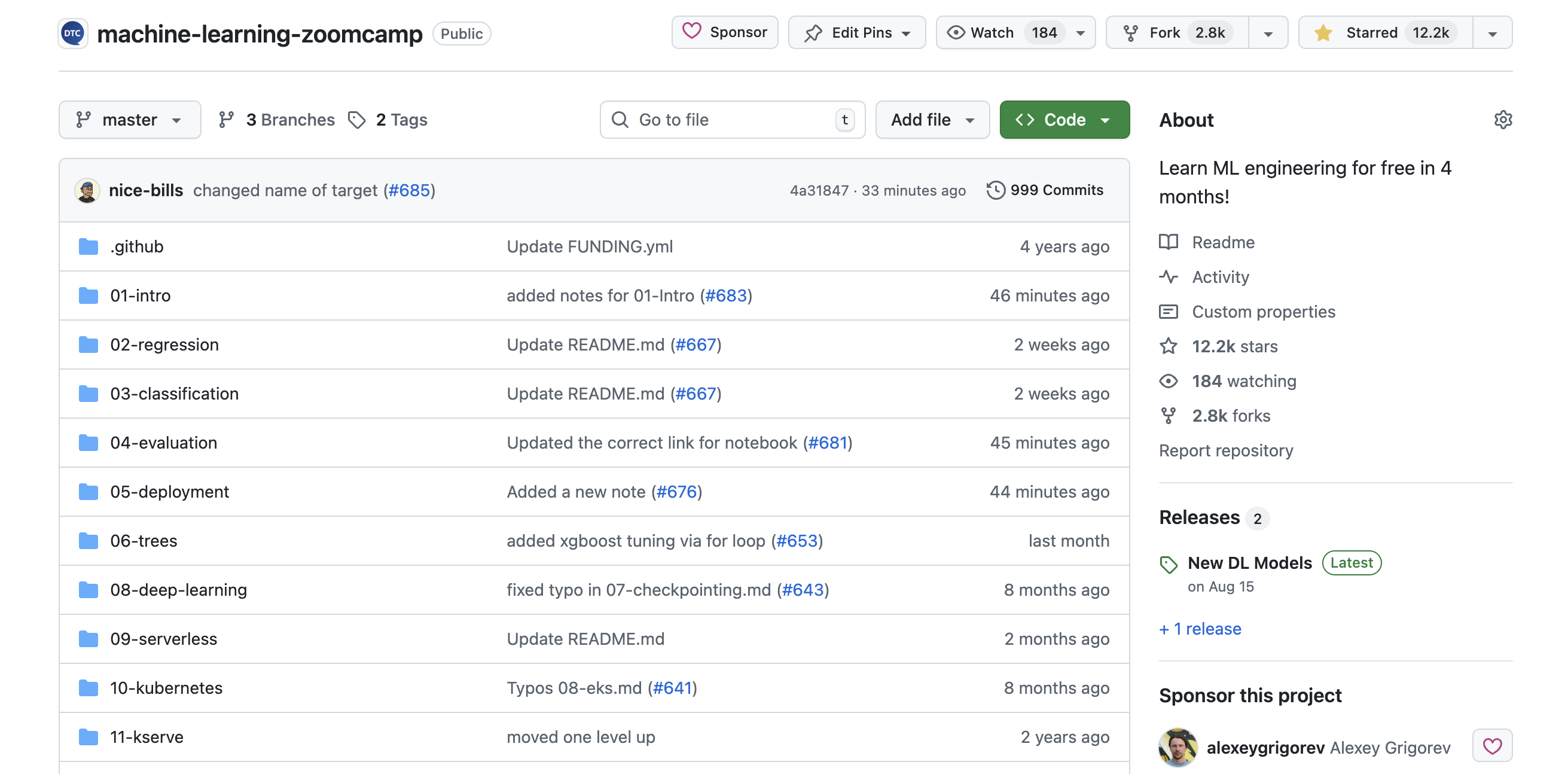
Free practical machine learning course with hands-on projects and deployment skills
- Platform: DataTalks.Club (ML Zoomcamp)
- Provider: DataTalks.Club (instructor: Alexey Grigorev)
- Difficulty Level: Beginner-Intermediate (coding experience required; no prior ML needed)
- Format: Free course offered in two modes—self-paced (full materials) or a 4-month live cohort with weekly assignments, project reviews, and Slack community
- Duration: ~4 months (live cohort starting September 2025) or self-paced
- Certificate: Available for free upon completion for the live cohort; not issued for the self-paced track
Machine Learning Zoomcamp is a practical, end-to-end ML engineering course that takes learners from core foundations to production deployment. You’ll cover regression and classification, evaluation and cross-validation, trees and gradient boosting, and deep learning (CNNs, transfer learning). A deployment track focuses on packaging and serving models (FastAPI APIs, Docker, cloud, serverless, ONNX Runtime, Kubernetes, optional KServe) plus monitoring and CI/CD. The program centers on building: a midterm end-to-end project and a capstone production system, emphasizing reproducible code, system design, and documentation, supported by a structured homework cadence and an active community.
Examples of the final projects:
-
Blood Cell Classifier for Cancer Prediction (Computer Vision)
-
Waste Classifier (Computer Vision)
2. Google Machine Learning Crash Course (MLCC)
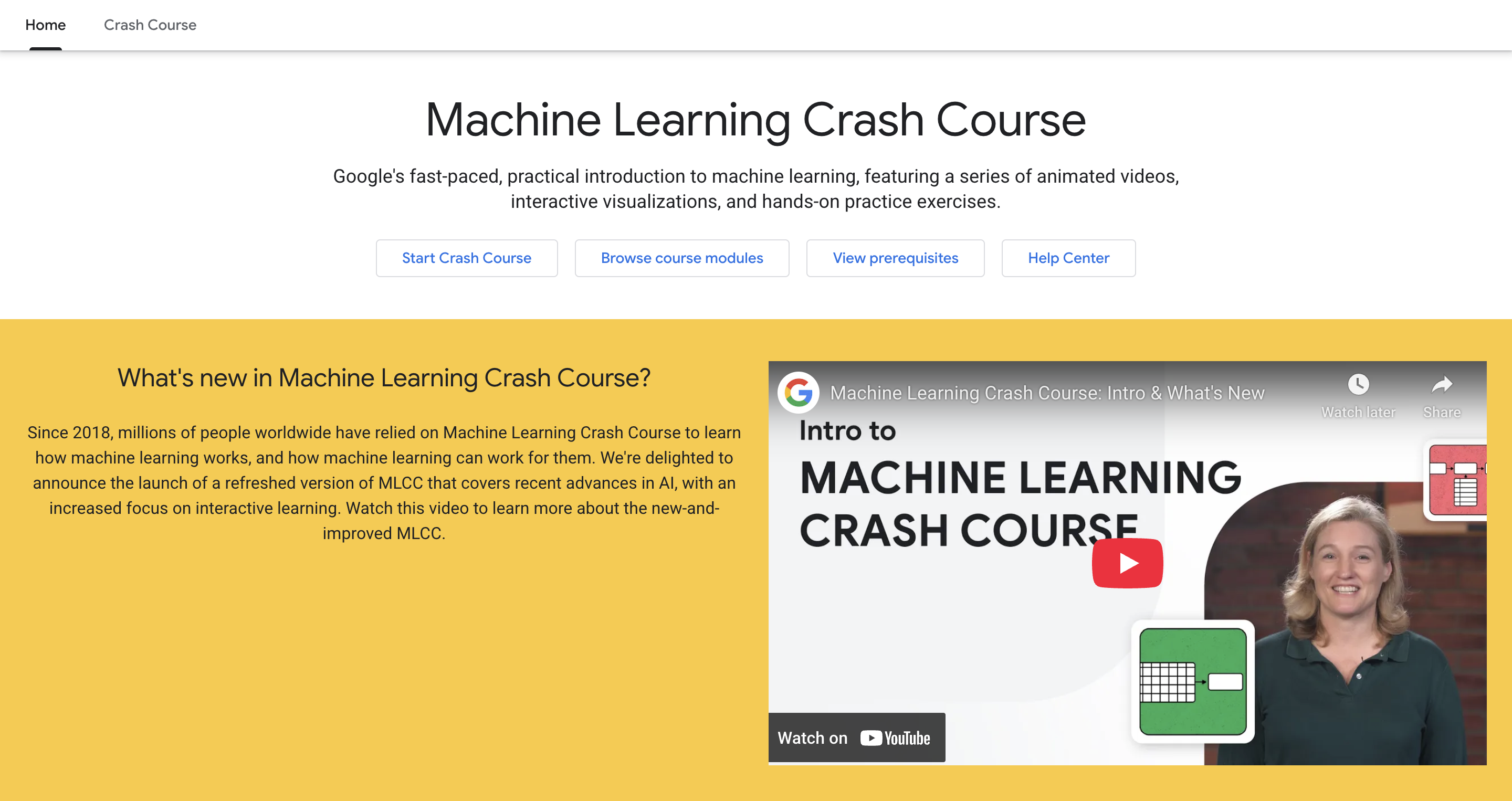
Google's practical introduction to machine learning with interactive demos and coding exercises
- Platform: Google Developers
- Provider: Google
- Difficulty Level: Beginner-Intermediate
- Format: Free, self-paced course
- Duration: Self-paced (module-based; time commitment varies)
- Certificate: Not available
“Machine Learning Crash Course” by Google is a practical introduction to ML that combines short videos, interactive demos, and coding exercises. Core modules cover linear and logistic regression, binary classification metrics, and data preparation for numerical and categorical features (including one-hot, feature hashing, mean encoding, and feature crosses), plus generalization and overfitting. Advanced modules introduce neural networks, embeddings, and a primer on large language models (tokens, Transformers, training basics). Real-world tracks address production ML systems, AutoML, and ML fairness, emphasizing deployment considerations and responsible practice.
3. Microsoft "ML for Beginners"
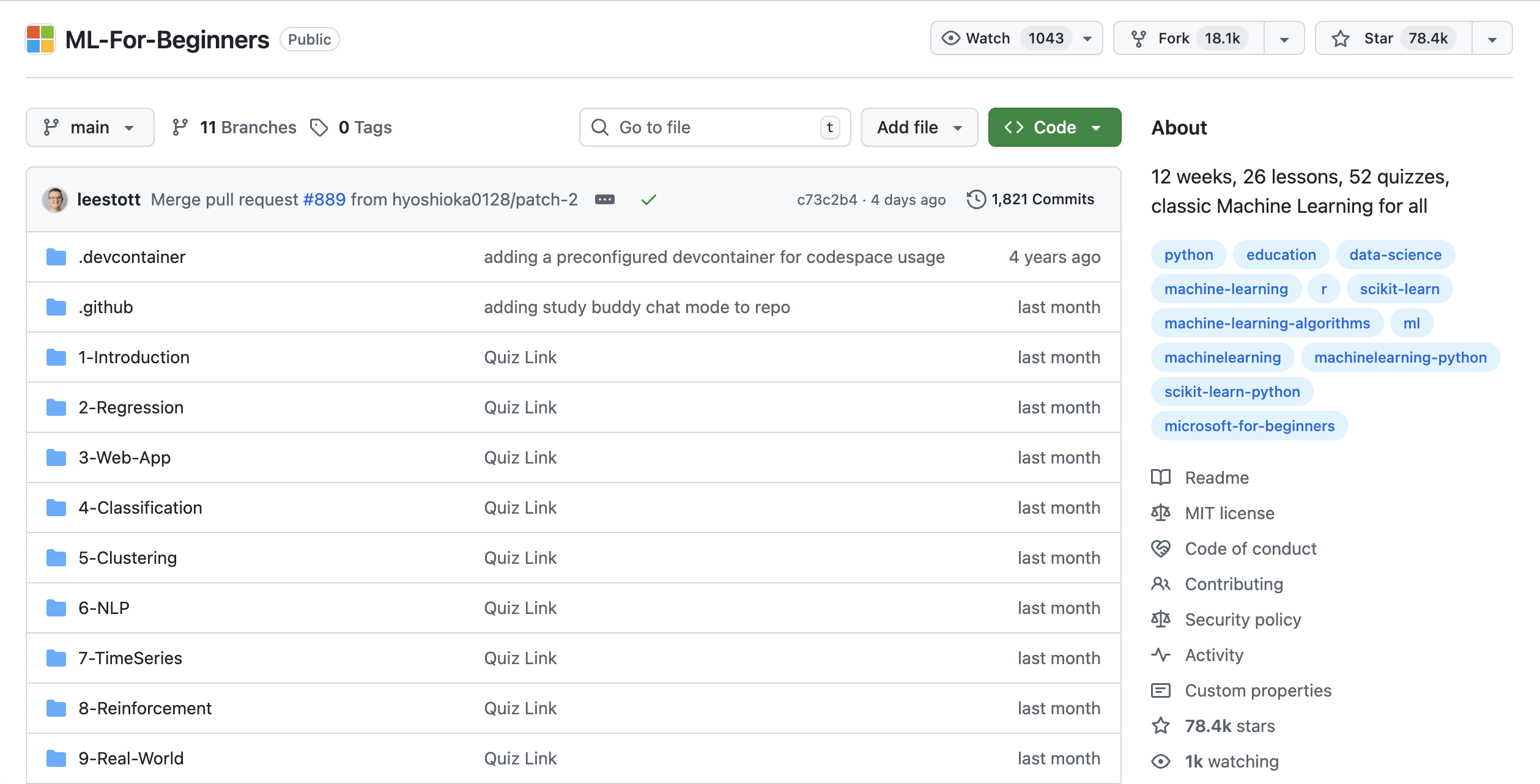
Project-based machine learning curriculum by Microsoft with 26 lessons and hands-on assignments
- Platform: GitHub (open-source curriculum; supplemental modules on Microsoft Learn)
- Provider: Microsoft (Cloud Advocates)
- Difficulty Level: Beginner
- Format: Free, self-paced curriculum
- Duration: 12 weeks (self-paced; time per week varies)
- Certificate: Not available
“Machine Learning for Beginners” by Microsoft is a project-based, introductory curriculum that teaches classical ML with Python and scikit-learn—deliberately avoiding deep learning. Organized as 26 lessons over 12 weeks, it blends short readings, knowledge checks, and coding assignments with end-to-end mini-projects (including a simple web app) to reinforce practice. Datasets and examples span global contexts, and many lessons have R equivalents. You’ll progress from fundamentals and regression to classification, clustering, NLP, time series, and reinforcement learning, with frequent quizzes and structured challenges to solidify concepts. The repository includes solutions, a quiz app, translation support, and guidance for both self-learners and instructors.
4. Machine Learning with Python by IBM
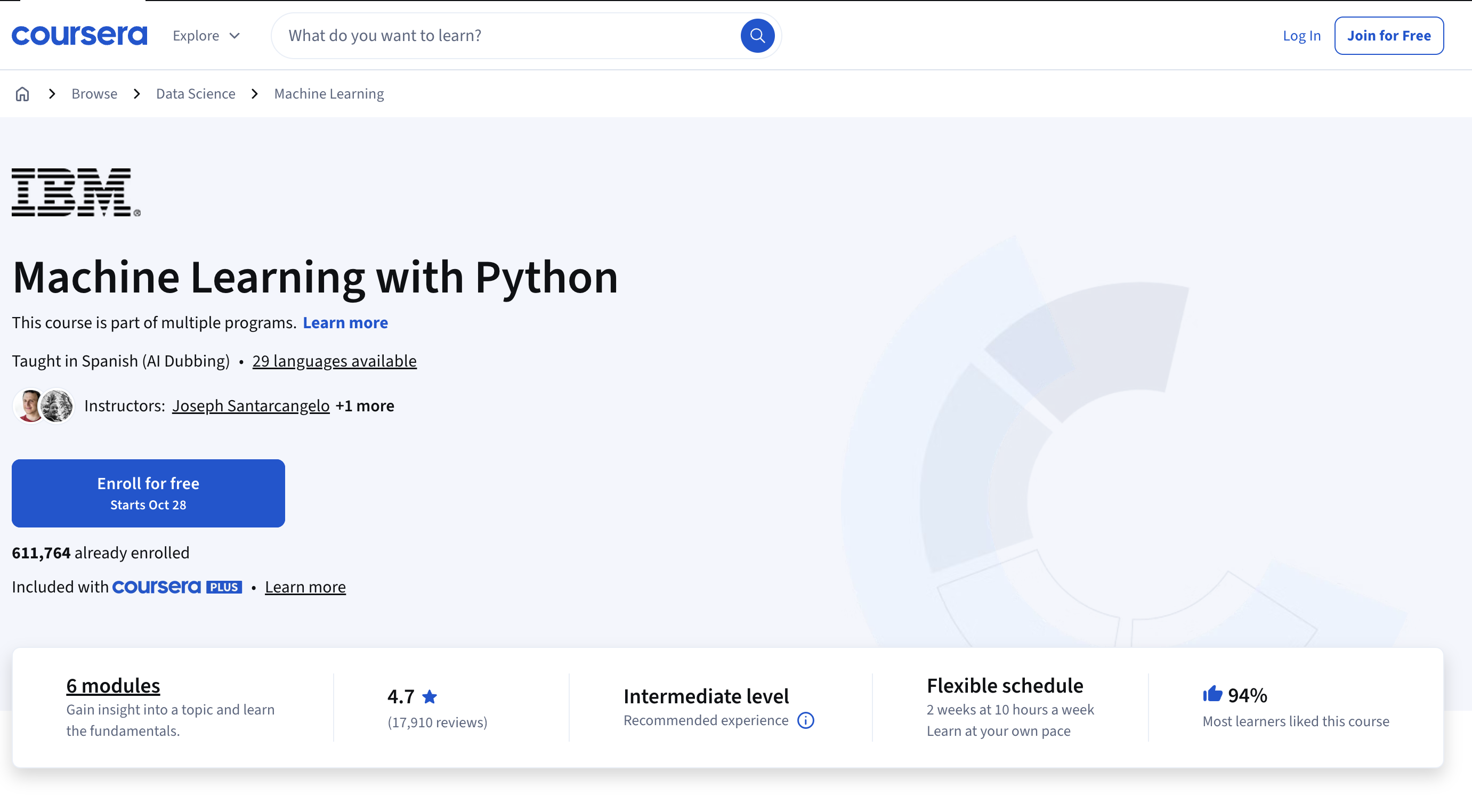
Practical machine learning with Python and scikit-learn by IBM with labs and projects
- Platform: Coursera
- Provider: IBM
- Difficulty Level: Intermediate (recommended experience)
- Format: Self-paced online course
- Duration: ~2 weeks at ~10 hours/week
- Certificate: Audit free; optional certificate available (paid)
“Machine Learning with Python” by IBM gives a practical introduction to machine learning with Python and scikit-learn. You’ll cover core concepts and roles in ML; implement regression (linear, multiple linear, polynomial, logistic), supervised methods (decision trees, k-nearest neighbors, SVM), and unsupervised techniques (clustering; dimensionality reduction with PCA, t-SNE, UMAP). Labs emphasize model evaluation (metrics, cross-validation, regularization) and pipeline optimization. A rainfall-prediction project and a course-wide exam consolidate skills. Instructors: Joseph Santarcangelo and Jeff Grossman (IBM).
5. Machine Learning Specialization by DeepLearning.AI
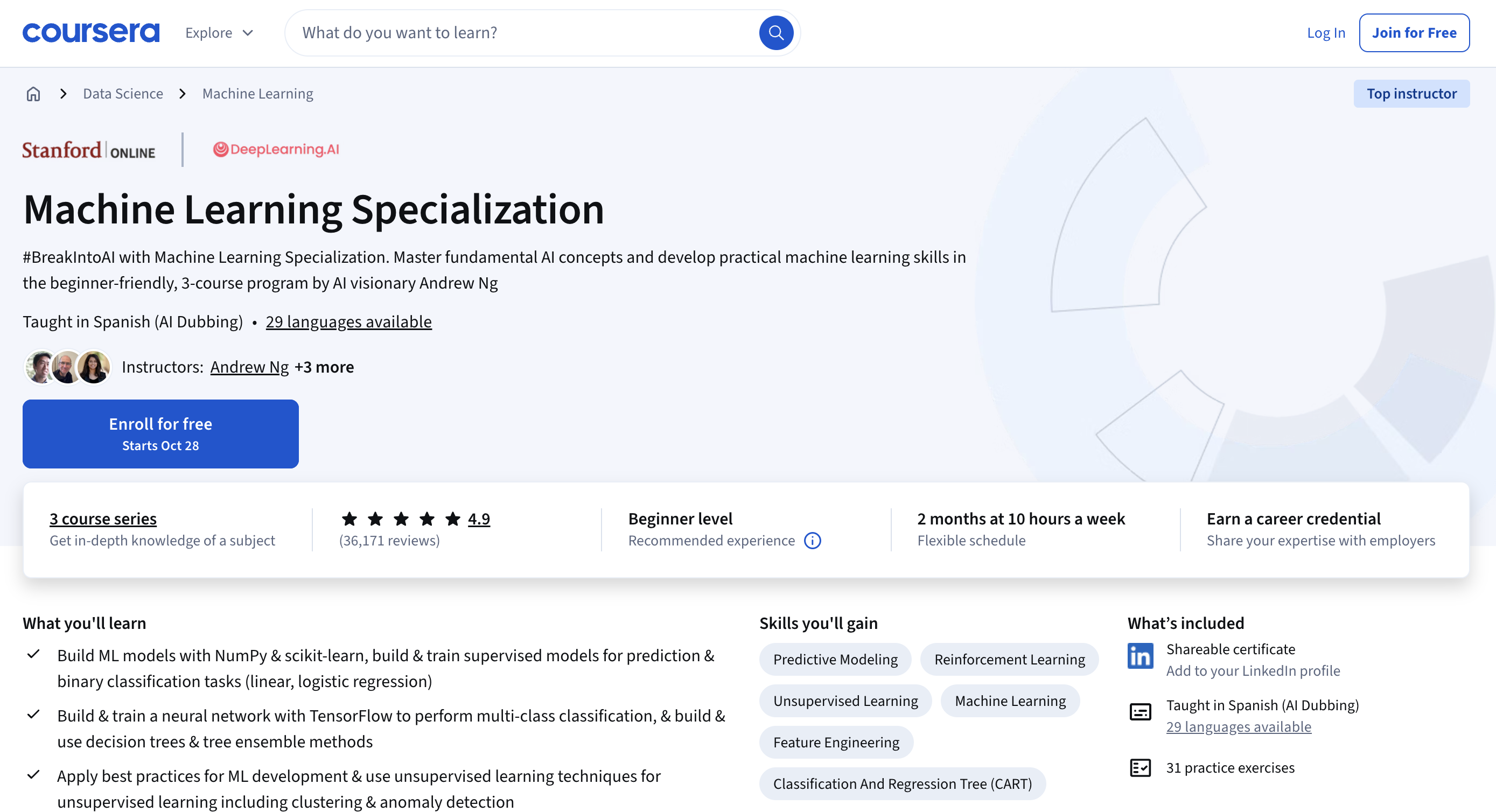
Beginner-friendly ML specialization taught by Andrew Ng covering modern machine learning fundamentals
- Platform: Coursera
- Provider: DeepLearning.AI & Stanford Online (offered by Stanford University and DeepLearning.AI)
- Difficulty Level: Beginner (recommended experience)
- Format: Self-paced Specialization; 3 courses
- Duration: ~2 months at ~10 hours/week (≈94 hours total)
- Certificate: Audit free; optional certificate available (paid)
“Machine Learning Specialization” by DeepLearning.AI is a beginner-friendly, three-course program (taught by Andrew Ng) covers the fundamentals of modern machine learning and how to apply them in practice. You’ll build models in Python with NumPy and scikit-learn; implement supervised learning for regression and classification (linear/logistic regression, neural networks with PyTorch, decision trees and tree ensembles); apply best practices for evaluation and data-centric improvement; and use unsupervised methods such as clustering and anomaly detection. The final course adds recommender systems (collaborative filtering, content-based deep learning) and an introduction to deep reinforcement learning.
6. StanfordOnline: Statistical Learning with Python
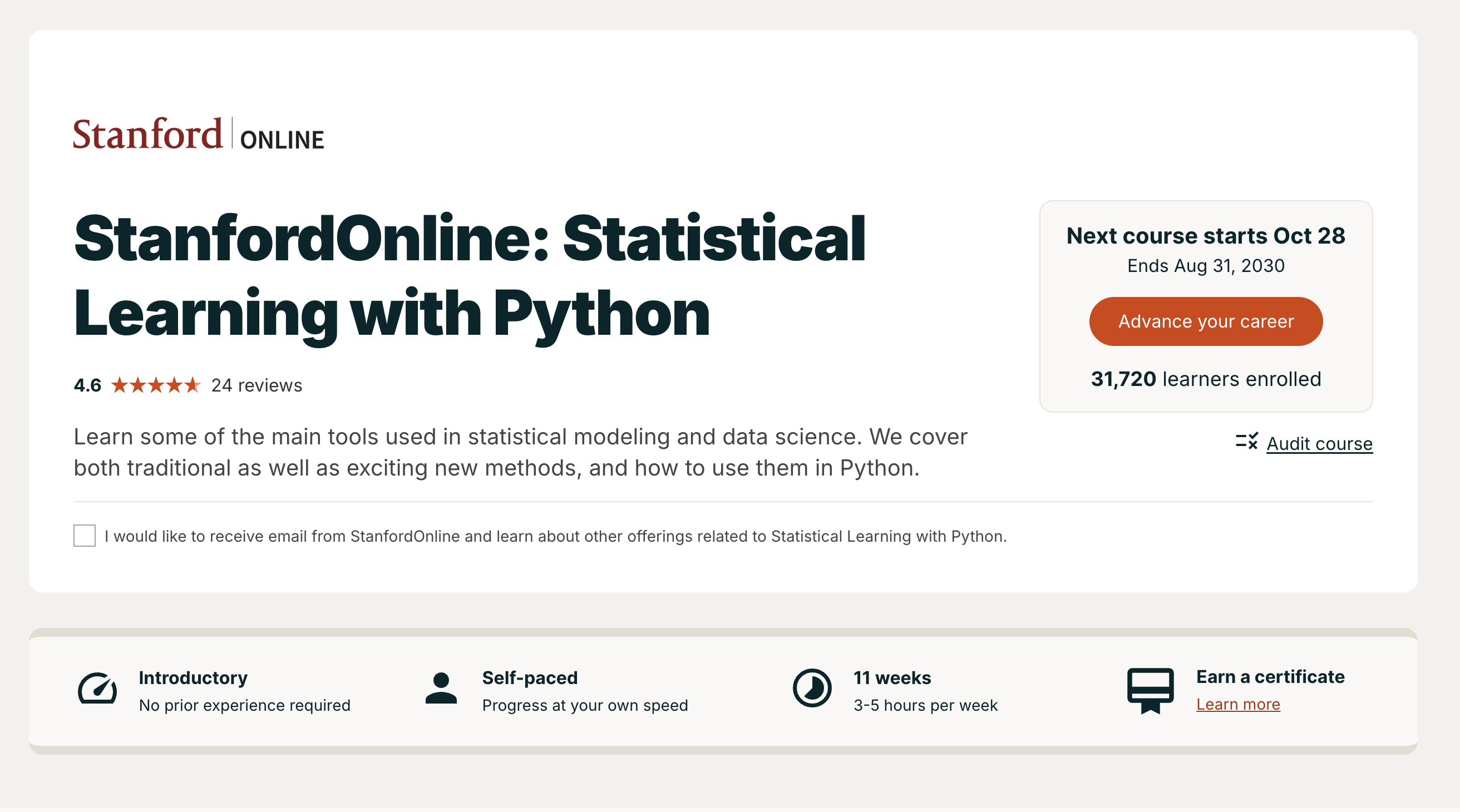
Stanford's statistical learning course with Python labs aligned with the ISLP textbook
- Platform: edX
- Provider: StanfordOnline
- Difficulty Level: Introductory
- Format: Self-paced online course
- Duration: ~11 weeks at 3-5 hours/week
- Certificate: Audit free; optional certificate available (paid)
“Statistical Learning with Python” by StanfordOnline led by Trevor Hastie, Robert Tibshirani, and Jonathan Taylor centers on regression and classification and builds practical intuition for resampling (cross-validation, bootstrap), model selection and regularization (ridge, lasso), nonlinear modeling (splines, GAMs), tree-based methods (trees, random forests, boosting), support-vector machines, and a concise treatment of neural networks/deep learning. It also surveys unsupervised learning (PCA, k-means, hierarchical clustering), survival analysis, and multiple testing. Computing is done in Python with step-by-step labs that implement the methods covered in the lectures, closely aligned with the textbook An Introduction to Statistical Learning with Applications in Python.
7. MITx: Machine Learning with Python: from Linear Models to Deep Learning
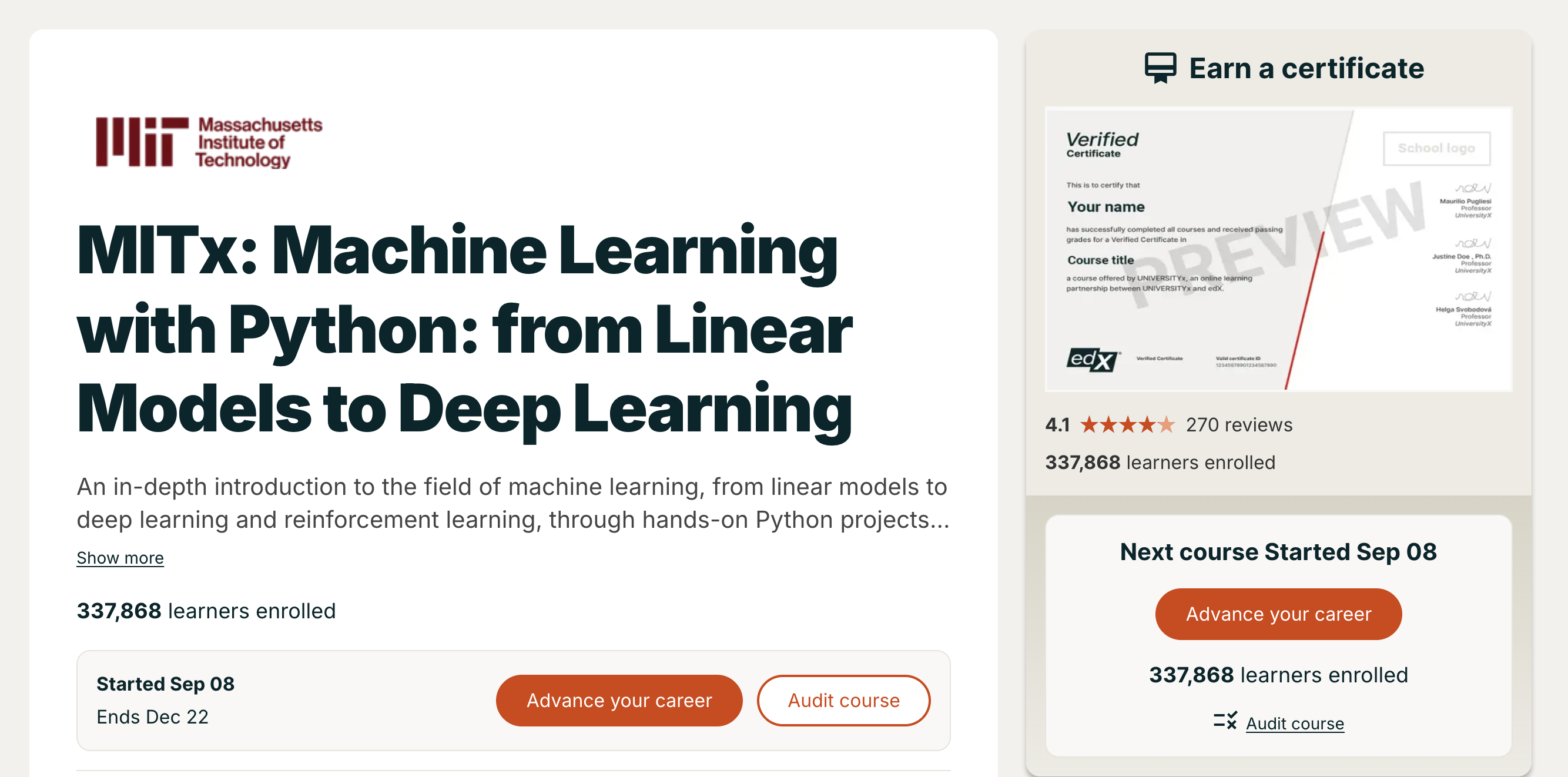
In-depth MIT course covering ML theory and implementation from linear models to deep learning
- Platform: edX
- Provider: MITx (Massachusetts Institute of Technology)
- Difficulty Level: Intermediate-Advanced (requires Python, probability, calculus, and linear algebra)
- Format: Instructor-paced online course
- Duration: ~15 weeks at 10-14 hours/week
- Certificate: Audit free; optional certificate available (paid)
“Machine Learning with Python: from Linear Models to Deep Learning” by MIT is an in-depth, instructor-led course that teaches how to turn training data into effective predictive systems. It develops the theory of representation, overfitting, regularization, and generalization (including VC dimension), and applies it to classification, regression, clustering, recommender problems, probabilistic modeling, and reinforcement learning. You’ll implement linear models, kernel methods and SVMs, neural networks (including deep and recurrent nets), and EM-based generative models, while practicing end-to-end project organization from training/validation and hyperparameter tuning to feature engineering. Projects include an automatic review analyzer, digit recognition with neural networks, and a reinforcement-learning task. Instructors include Regina Barzilay, Tommi Jaakkola, and Karene Chu.
8. Data Science: Machine Learning by Harvard
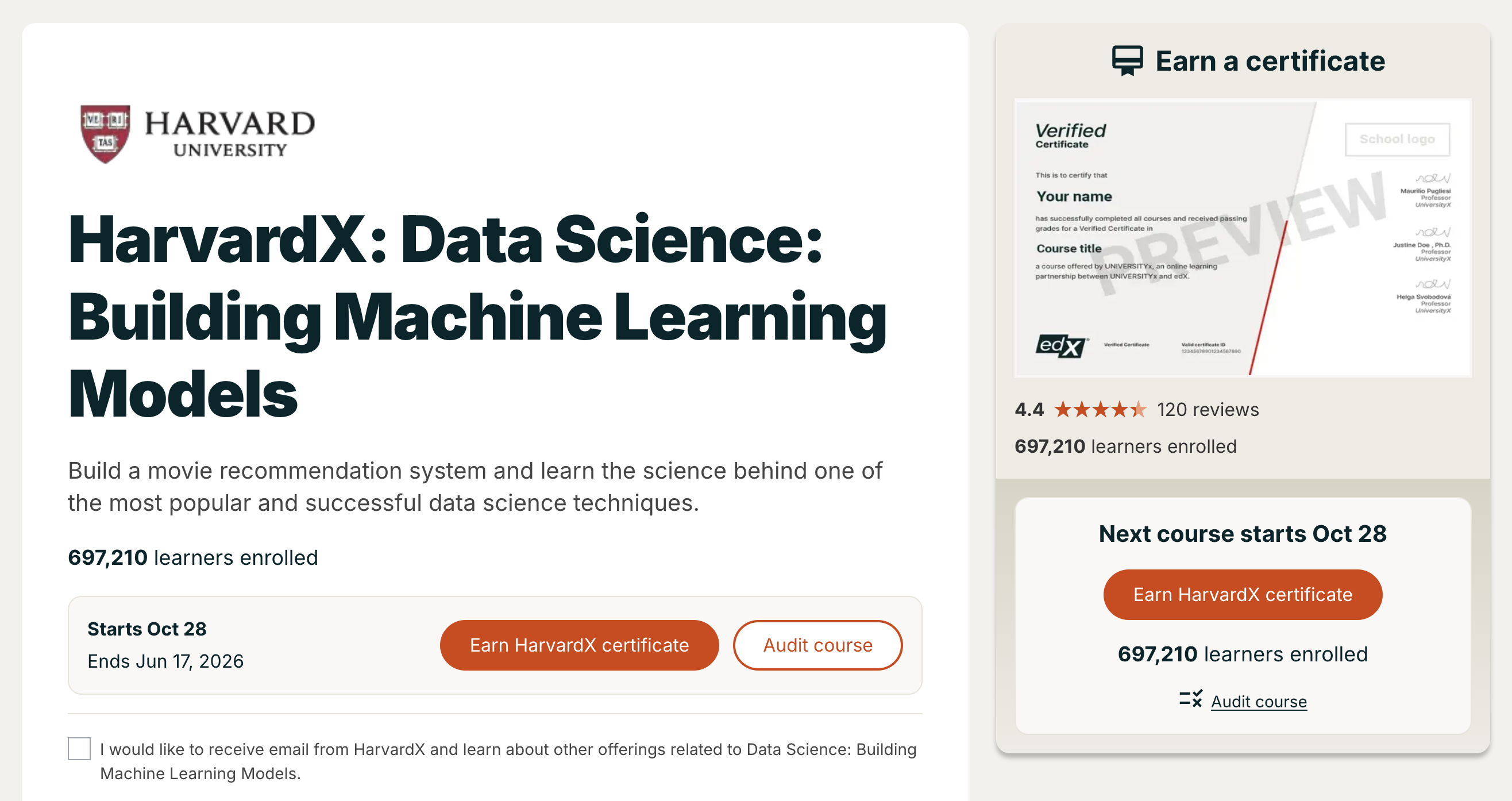
Harvard's hands-on ML course focused on building a movie recommendation system end-to-end
- Platform: edX
- Provider: HarvardX
- Difficulty Level: Introductory
- Format: Self-paced online course
- Duration: ~8 weeks at 2-4 hours/week
- Certificate: Audit free; optional certificate available (paid)
“Data Science: Machine Learning” by Harvard teaches core machine learning skills by guiding you through building a movie recommendation system end to end. You’ll work with training data to uncover predictive relationships, practice cross-validation to avoid overfitting, and implement several common algorithms with an emphasis on when and why they work. Along the way, you’ll learn about regularization and principal component analysis and apply them in a practical pipeline. Designed for learners in the HarvardX Professional Certificate in Data Science, it balances fundamentals with hands-on implementation to develop sound intuition for ML model development and evaluation.
9. Stanford CS229
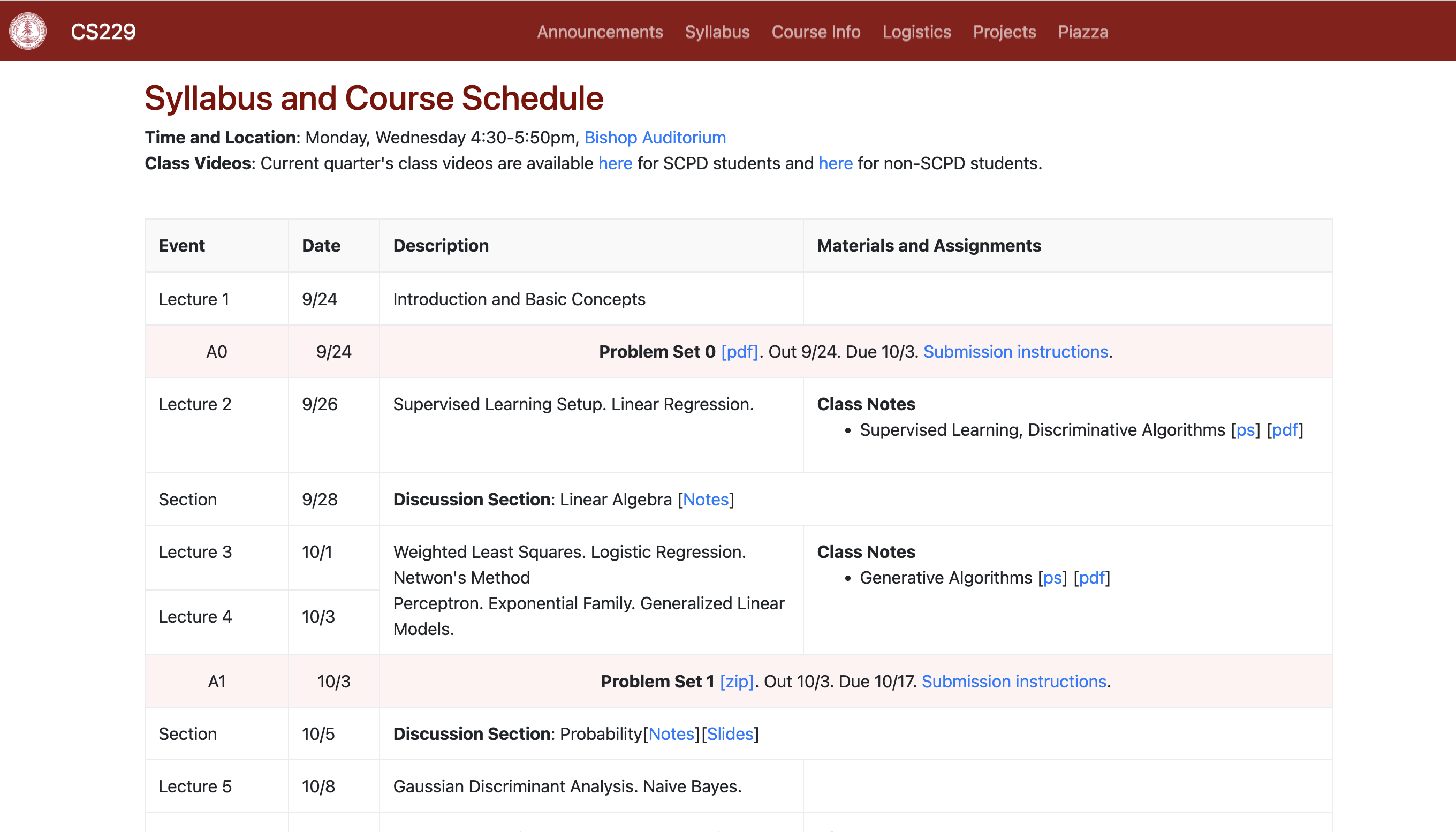
Stanford's rigorous ML course covering theory and applications in robotics, data mining, and bioinformatics
- Platform: Stanford University course website
- Provider: Stanford University (CS)
- Difficulty Level: Intermediate-Advanced (requires Python/NumPy, probability, multivariable calculus, and linear algebra)
- Format: Instructor-led university course
- Duration: Summer 2025 (June 24-August 16, 2025)
- Certificate: Not available
CS229 “Machine Learning” is a broad, rigorous introduction to machine learning and statistical pattern recognition. The course covers:
- Supervised learning (generative vs. discriminative models; parametric and non-parametric methods; logistic/linear regression; neural networks; support vector machines)
- Unsupervised learning (clustering, dimensionality reduction, kernel methods)
- Elements of learning theory (bias-variance, generalization)
- Reinforcement learning/adaptive control.
Students practice through problem sets and companion lectures, with recent offerings adding topical guest sessions (e.g., agentic systems, sequence models, time-series forecasting) to connect core theory with modern applications in areas like robotics, data mining, bioinformatics, speech, and text/web processing.
10. UC Berkeley CS189/289A (upper-undergrad/grad)
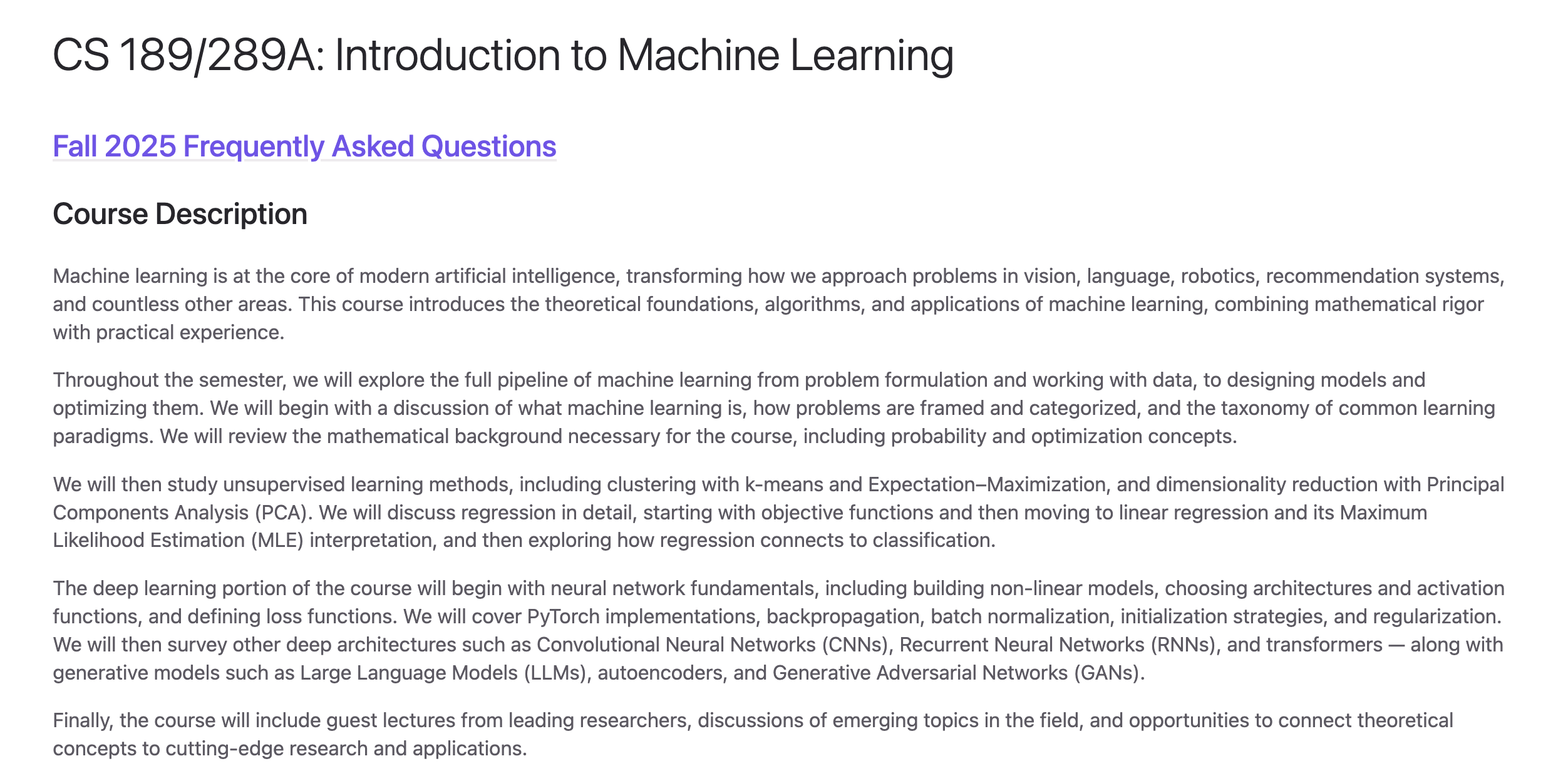
Berkeley's comprehensive ML survey balancing theory and implementation with modern topics
- Platform: University course website (UC Berkeley CS 189/289A)
- Provider: University of California, Berkeley (EECS)
- Difficulty Level: Intermediate-Advanced
- Format: Instructor-led university course
- Duration: ~16 weeks
- Certificate: Not available
CS 189/289A “Introduction to Machine Learning” is Berkeley’s rigorous survey of modern ML, balancing theory and implementation. The course builds from probabilistic modeling and linear/logistic regression into neural networks (backpropagation, CNNs, attention/Transformers) and model evaluation, then broadens to dimensionality reduction (PCA, t-SNE), clustering, nearest neighbors, and tree/ensemble methods. Later units cover graphical models and HMMs, Markov decision processes and reinforcement learning, plus contemporary topics such as graph neural networks, language/vision applications, and causality. Students apply concepts through weekly discussions and programming assignments, with a midterm and final consolidating both mathematical grounding and practical skills.
11. Introduction to Machine Learning (MIT 6.036)
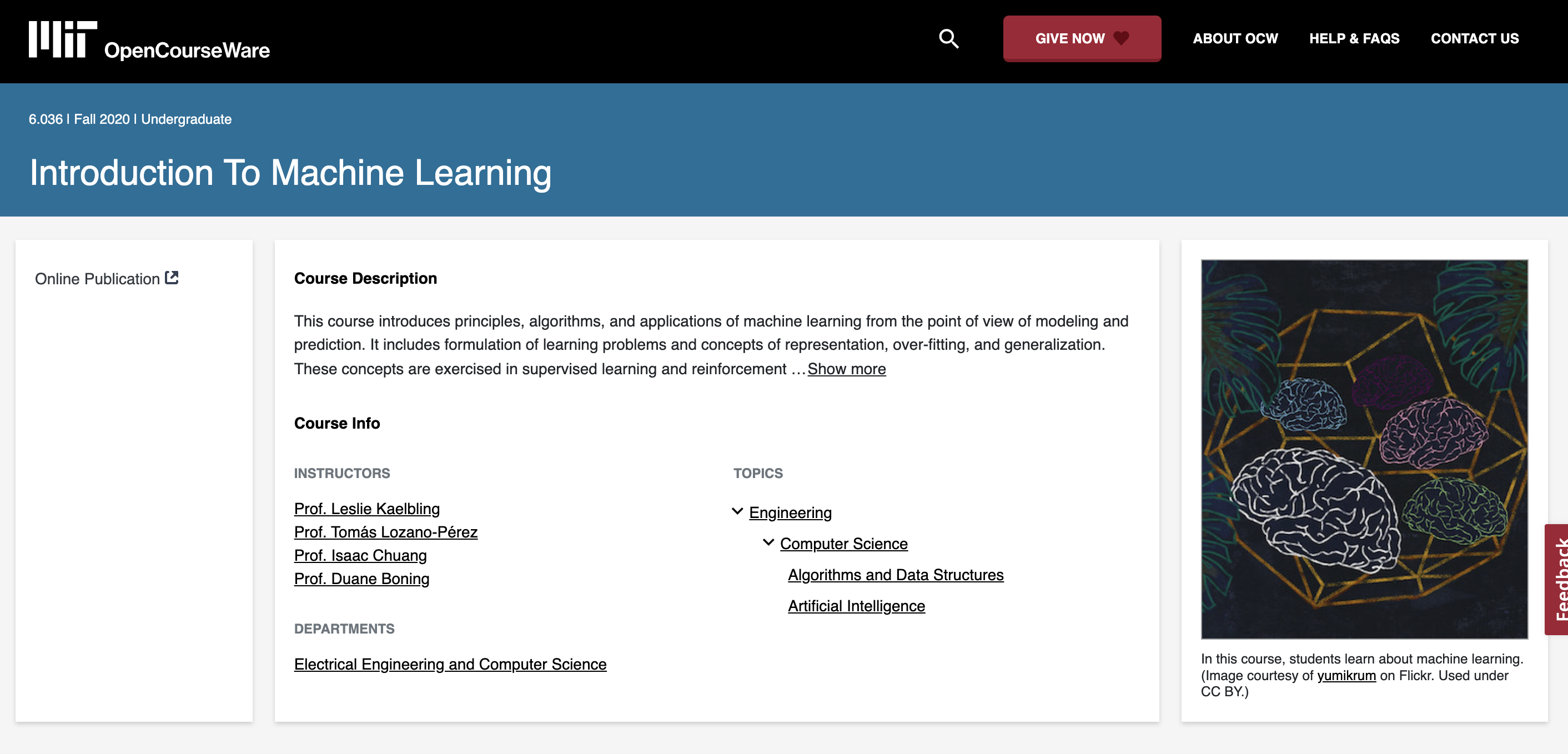
MIT's foundational ML course with lectures, labs, and exercises building conceptual understanding
- Platform: MIT Open Learning Library
- Provider: Massachusetts Institute of Technology (MIT)
- Difficulty Level: Intermediate (Python programming, calculus, and linear algebra recommended)
- Format: Free, self-paced online course
- Duration: ~13 weeks
- Certificate: Not available
“Introduction to Machine Learning” (MIT 6.036) formulates well-specified learning problems and develops core ideas of representation, overfitting, and generalization. These principles are applied in supervised learning and reinforcement learning, with example applications to images and temporal sequences. Materials include lectures, notes, labs, and graded-style exercises to build both conceptual understanding and practical skills.
12. Caltech CS156 "Learning from Data"
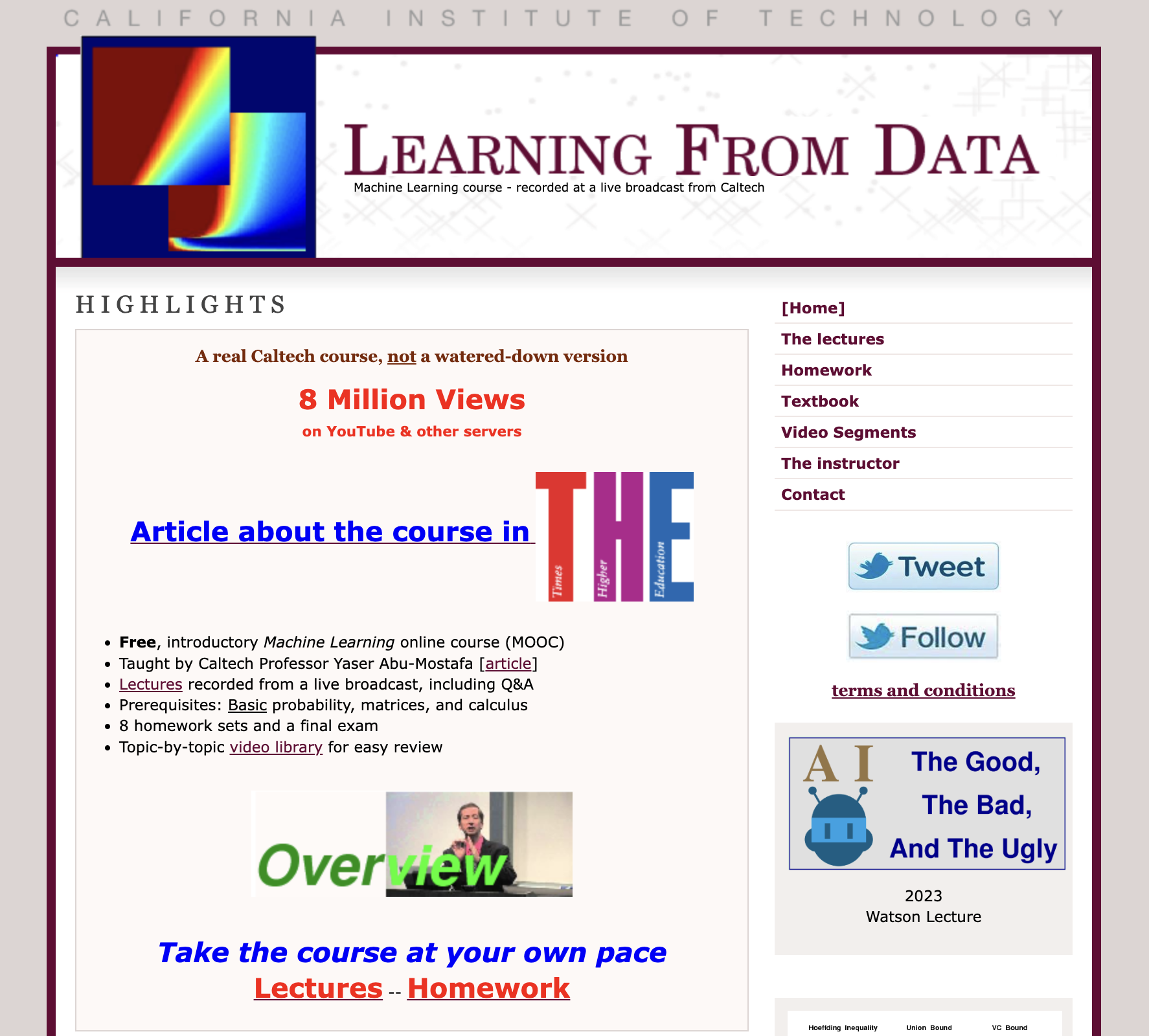
Caltech's ML course blending rigorous theory with practical intuition and implementation
- Platform: Caltech (course website / YouTube)
- Provider: California Institute of Technology (Caltech)
- Difficulty Level: Introductory-Intermediate (requires basic probability, linear algebra with matrices, and calculus)
- Format: Free, self-paced MOOC
- Duration: 18 lectures (~60 minutes each)
- Certificate: Not available
Recorded from a live Caltech broadcast, Yaser S. Abu-Mostafa’s Machine Learning course blends rigorous theory with practical intuition. It develops generalization foundations (training vs. testing, VC dimension, bias-variance), then works through linear and logistic models, neural networks and backpropagation, overfitting, regularization, and validation. The course also covers SVMs, kernel methods, radial basis functions, and practitioner principles (Occam’s razor, sampling bias, data snooping), with a concluding synthesis that situates Bayesian and ensemble ideas. Learners practice via eight homework sets and a final exam, guided by clear mathematical framing and implementation-focused discussion.
13. Machine Learning by Carnegie Mellon University
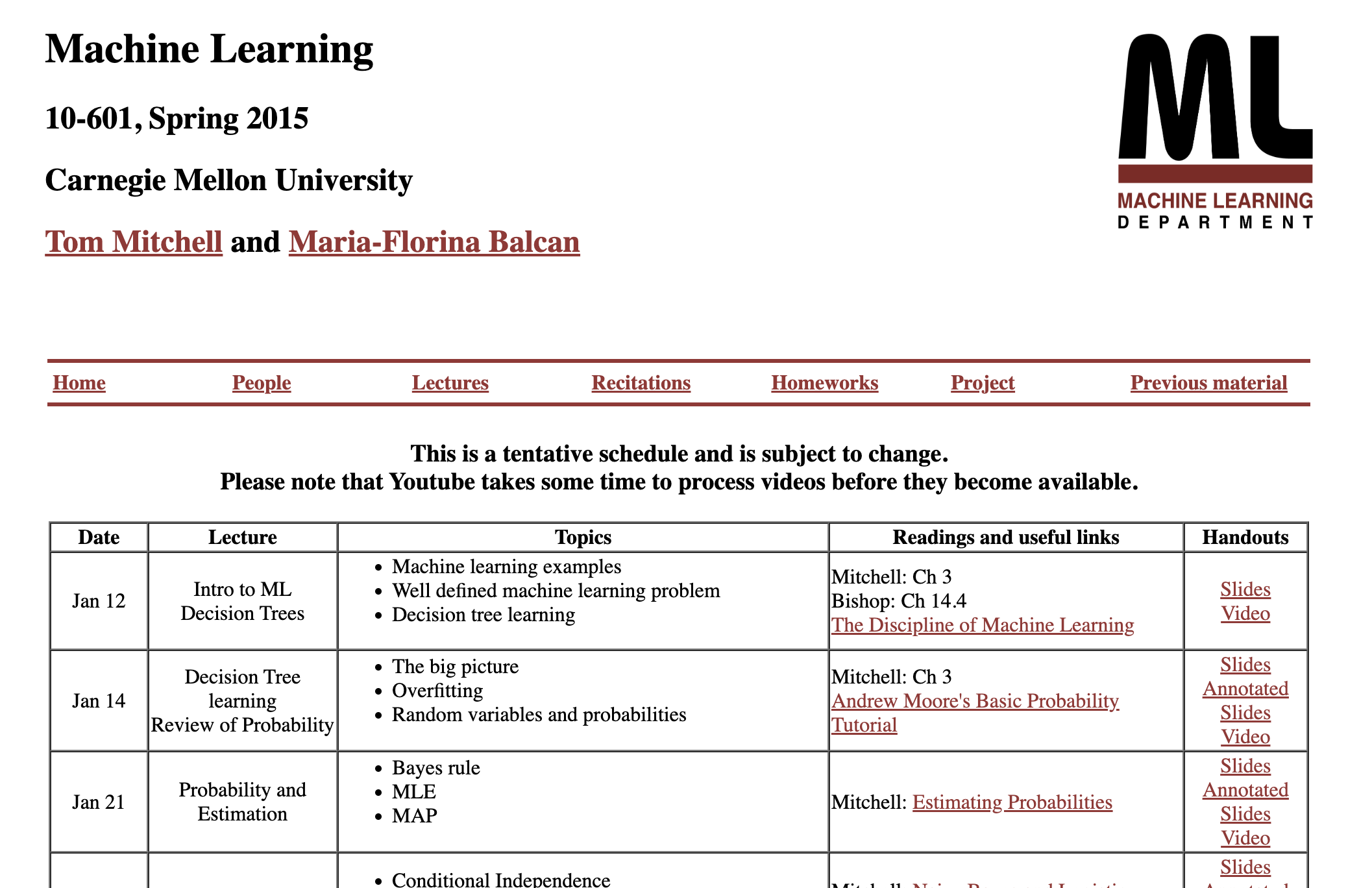
CMU's rigorous semester-long ML course blending formal theory with hands-on implementation
- Platform: Carnegie Mellon University (course website; open materials)
- Provider: Carnegie Mellon University (CMU)
- Difficulty Level: Intermediate-Advanced (upper-level undergraduate / intro graduate)
- Format: University lecture course; recorded lectures + slides; recitations; homeworks; programming project; two exams
- Duration: Spring 2015 semester (~16 weeks; Jan 12-Apr 29, 2015)
- Certificate: Not available
CMU’s 10-601 “Machine Learning”, taught by Tom Mitchell and Maria-Florina (Nina) Balcan, is a rigorous, semester-long introduction that blends theory with practice. The course builds from core supervised learning and probabilistic modeling into the mathematics of generalization and regularization, then moves through probabilistic graphical models and inference before tackling ensemble methods, kernel methods, and support vector machines. Mid-semester it shifts to semi-supervised and active learning and, later, to representation learning and dimensionality reduction, culminating with modern neural networks, deep learning, and a primer on reinforcement learning and privacy. Lectures, recitations, homeworks, a programming project, and two exams are designed to connect formal guarantees with hands-on implementation, mirroring the perspective of Mitchell’s classic textbook while updating it with contemporary practice.
14. Mathematics for Machine Learning Specialization by Imperial College London
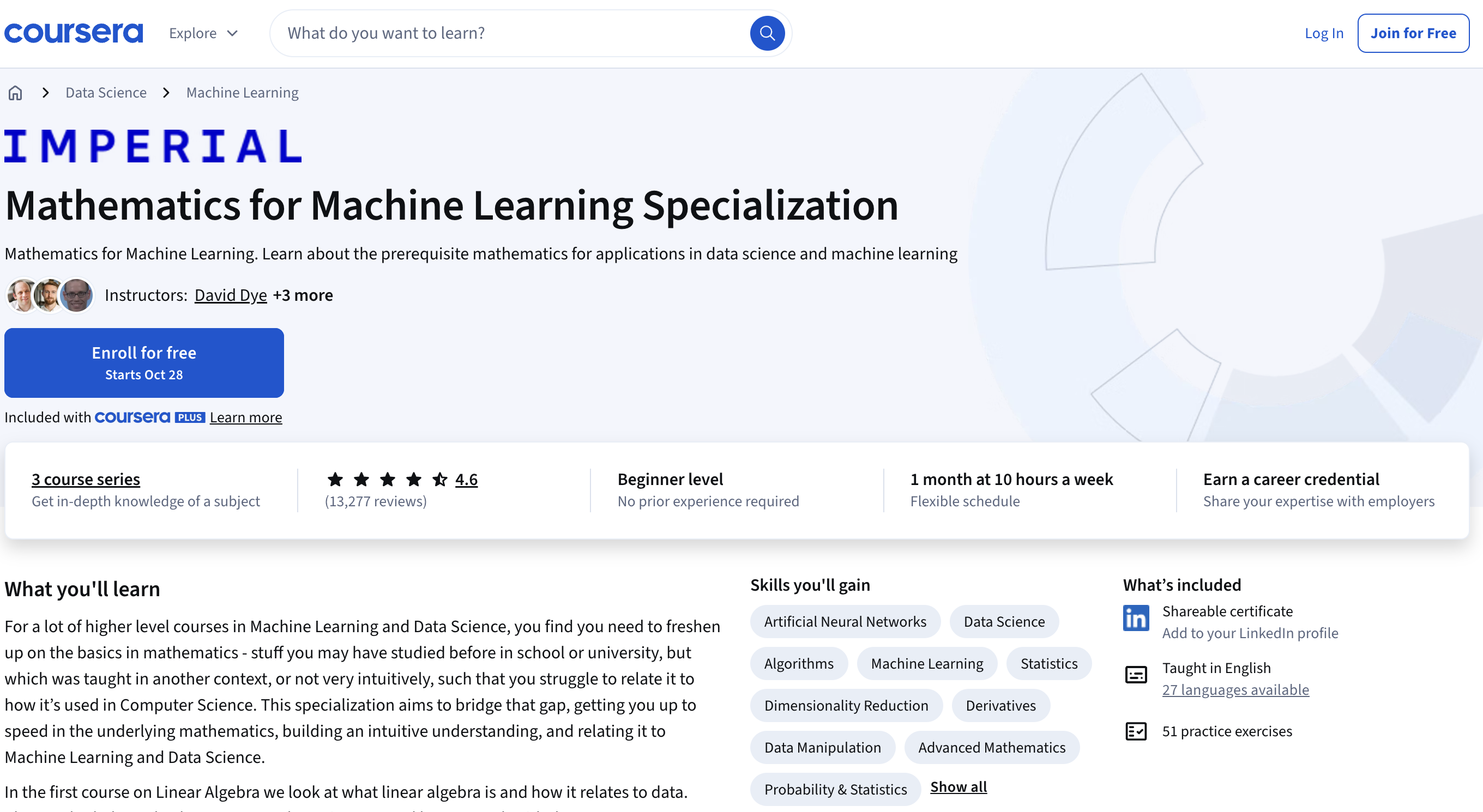
Three-course math sequence building essential foundations for understanding ML algorithms
- Platform: Coursera
- Provider: Imperial College London
- Difficulty Level: Foundational to Intermediate (math-focused)
- Format: Self-paced Specialization; 3 courses (Linear Algebra, Multivariate Calculus, Principal Component Analysis); video lectures, quizzes, and exercises
- Duration: ~4-6 weeks per course (≈12-18 weeks total), learn at your own pace
- Certificate: Audit free; optional certificate available (paid)
“Mathematics for Machine Learning” by Imperial College London is a three-course sequence that builds the core math needed to understand and implement ML algorithms. The Linear Algebra course covers vectors, matrices, dot products, basis changes, and eigenvalues/eigenvectors. Multivariate Calculus covers single- and multivariable differentiation, the chain rule, Jacobians, Hessians, Lagrange multipliers, and Taylor series. The PCA course connects linear algebra and calculus to statistics and geometry—orthogonality, projections, and dimensionality reduction—culminating in practical PCA applications. Courses are taught by Imperial College London faculty.
15. Machine Learning with Python by FreeCodeCamp
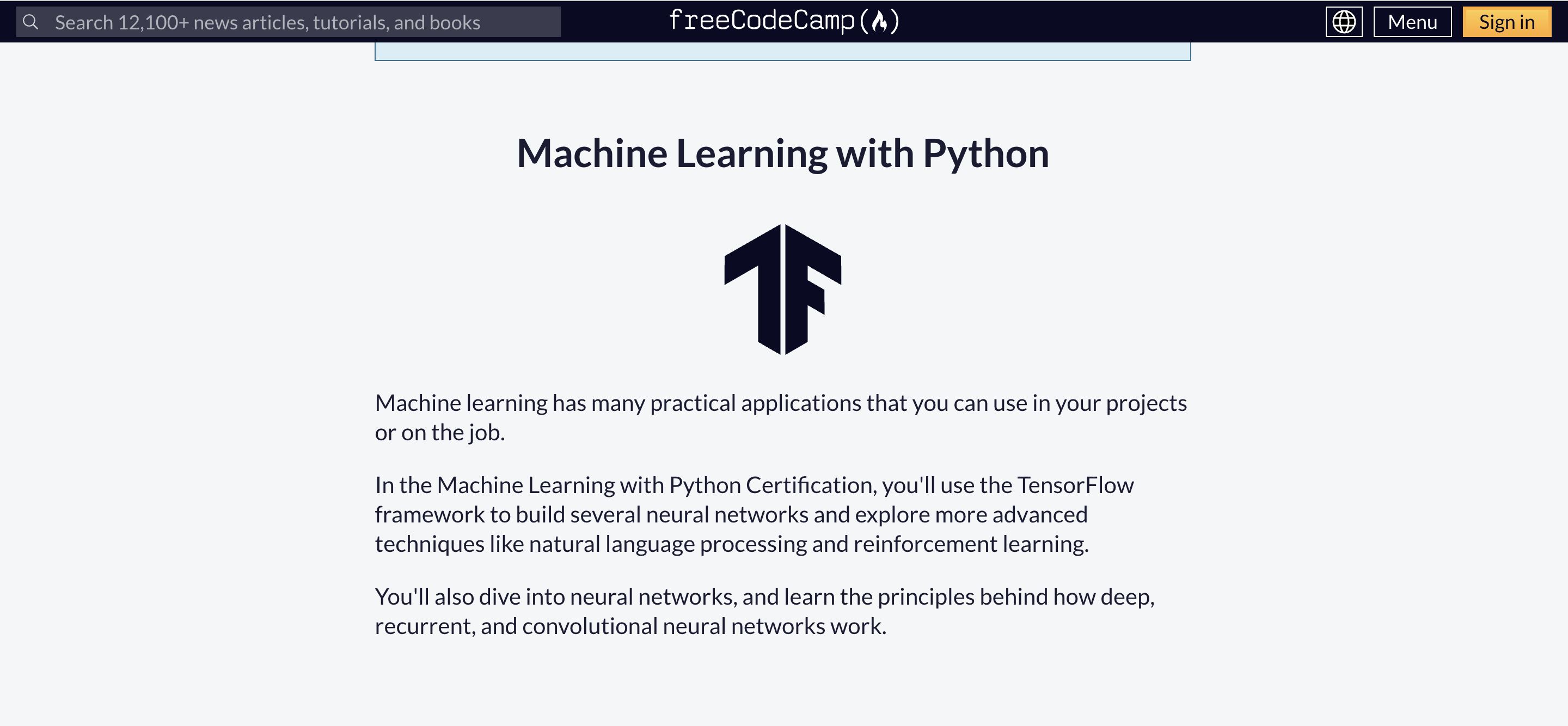
Practical ML certification with PyTorch covering computer vision, NLP, and recommendation systems
- Platform: freeCodeCamp
- Provider: freeCodeCamp
- Difficulty Level: Intermediate (Python experience recommended)
- Format: Self-paced online certification
- Duration: Self-paced (project-based; varies by learner)
- Certificate: freeCodeCamp “Machine Learning with Python” Certification (upon completing required projects)
“Machine Learning with Python” by FreeCodeCamp teaches practical machine learning with Python and PyTorch. You’ll build several neural networks and explore core and advanced topics including how neural networks work, CNNs, RNNs/LSTMs, natural language processing, and an introduction to reinforcement learning. Instruction combines a PyTorch course by Tim Ruscica (“Tech With Tim”) with conceptual videos by Brandon Rohrer. To earn the certificate, you complete hands-on projects such as Rock-Paper-Scissors, a Cat/Dog image classifier, a KNN book recommender, a linear-regression health-costs calculator, and an SMS text classifier, demonstrating applied skills across computer vision, NLP, recommendation, and regression.
16. Practical Deep Learning for Coders by Fast.ai
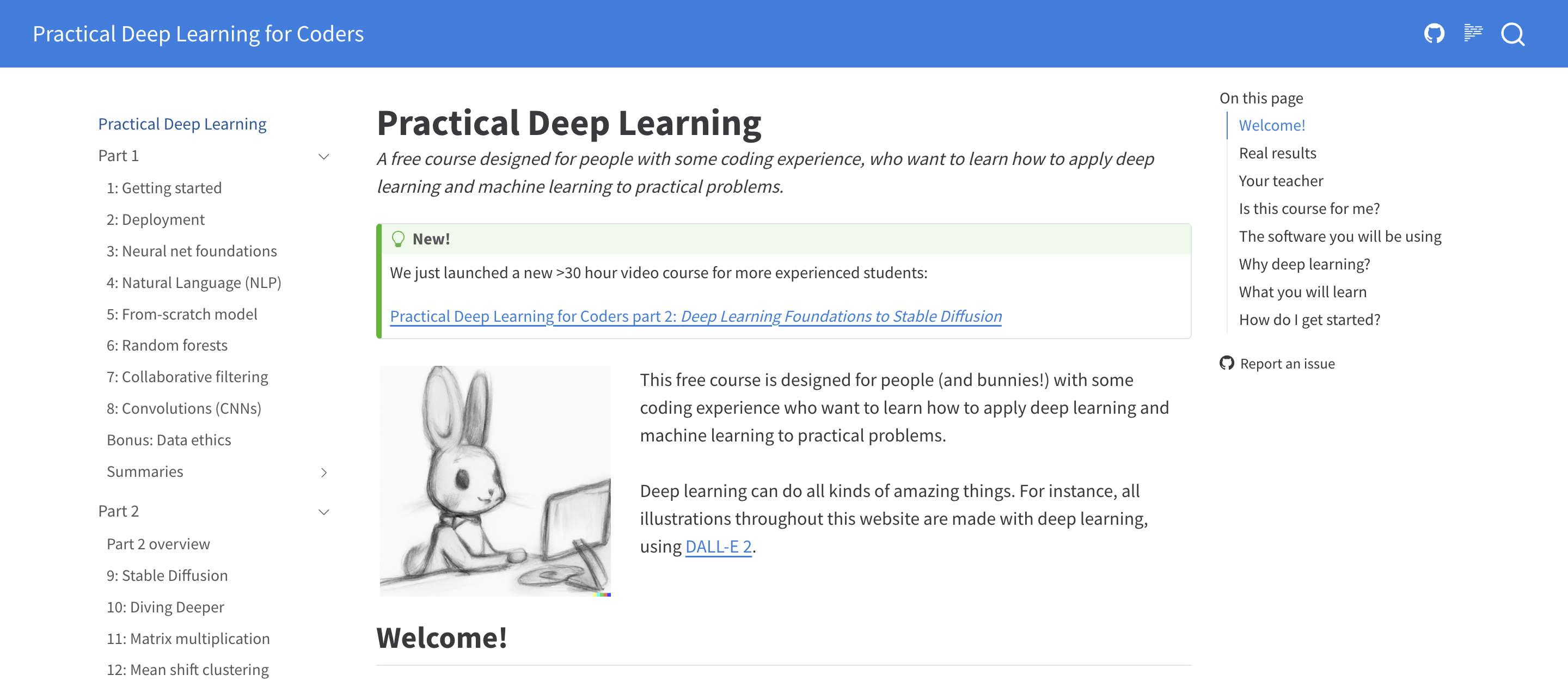
Beginner-friendly deep learning course by Jeremy Howard with coding-first approach
- Platform: fast.ai
- Provider: fast.ai (Jeremy Howard; co-created with Rachel Thomas)
- Difficulty Level: Beginner-friendly (requires basic coding; minimal math)
- Format: Free, self-paced video course
- Duration: ≈13.5 hours of core video
- Certificate: No formal certificate
“Practical Deep Learning for Coders” by Fast.ai teaches you to apply deep learning and machine learning to real problems without heavy prerequisites. Starting from working, state-of-the-art models, you’ll build and train systems for computer vision, NLP, tabular data, and collaborative filtering; create random-forest and regression baselines; and deploy models as simple web apps. Along the way you’ll learn transfer learning, data augmentation, weight decay, embeddings, and the training loop (including SGD) to understand why models work and how to improve them. The course emphasizes coding first, provides free cloud options for training, and is taught by Jeremy Howard.
17. Kaggle Machine Learning Courses

Short practical ML courses with hands-on coding in Kaggle notebooks and certificates
- Platform: Kaggle Learn (Micro-Courses)
- Provider: Kaggle
- Difficulty Level: Beginner-Intermediate
- Format: Self-paced micro-courses; short lessons with hands-on coding in Kaggle notebooks
- Duration: A few hours per course (self-paced)
- Certificate: Kaggle Learn certificate of completion
Kaggle has multiple short courses that you can take for free. Here are some of them you can start with:
- Intro to Machine Learning: Covers the core supervised-learning workflow: how ML models work, basic data exploration, model validation, underfitting vs. overfitting, and training a first tree-based model (random forests) directly in Kaggle notebooks.
- Intermediate Machine Learning: Builds production-minded skills: handling missing values, working with categorical variables, building ML pipelines, applying cross-validation, training XGBoost models, and preventing data leakage.
- Feature Engineering: Focuses on improving signal: using mutual information to assess feature relevance, creating features, and applying unsupervised feature methods (k-means clustering, PCA) plus target encoding.
Recommendation: take them in the order listed to ensure prerequisites are covered.
18. Machine learning in Python with scikit-learn by Inria
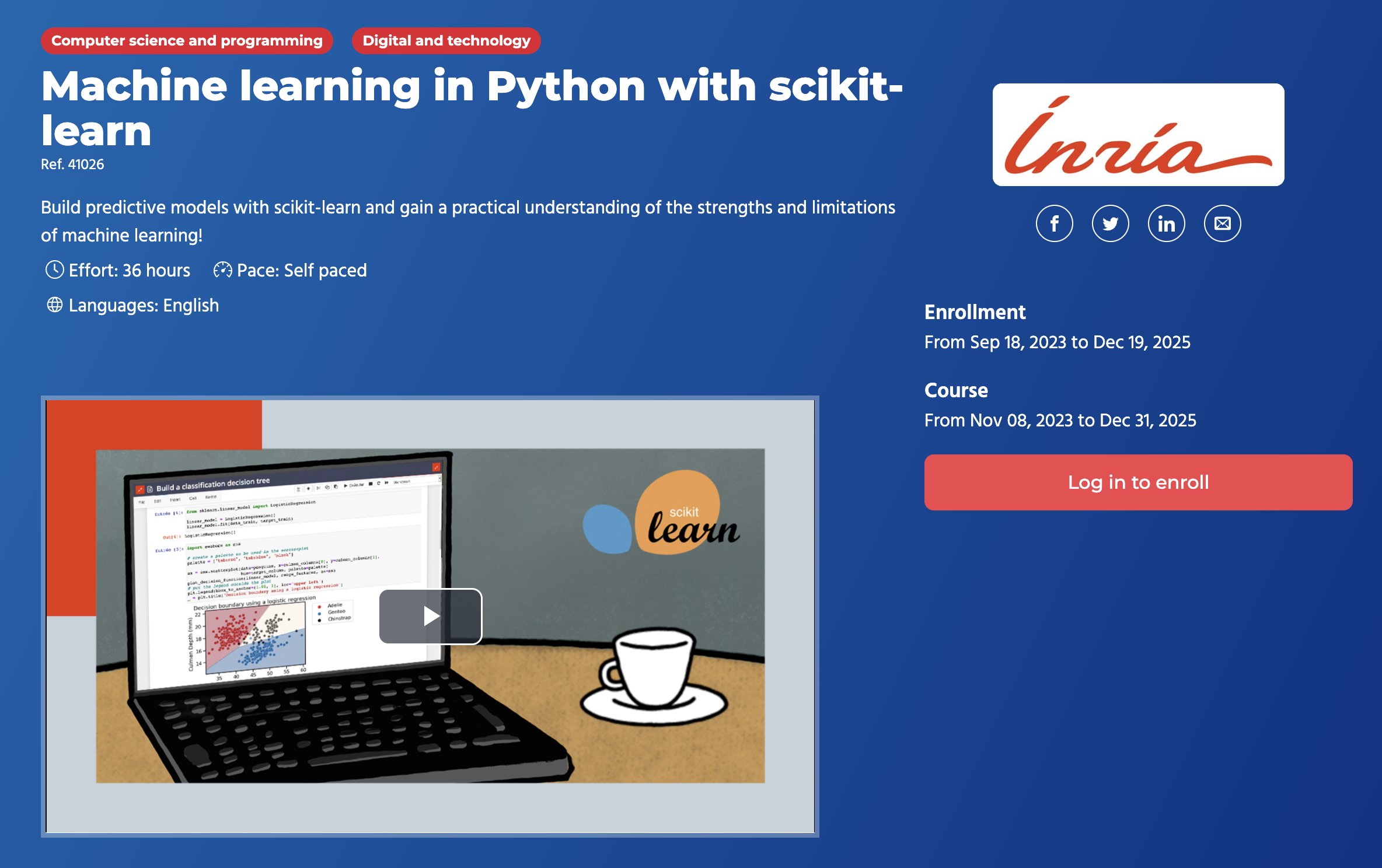
In-depth scikit-learn course taught by library's core developers with Jupyter notebooks
- Platform: FUN MOOC (France Université Numérique)
- Provider: Inria (by scikit-learn core developers)
- Difficulty Level: Intermediate (accessible with basic Python; NumPy/Pandas/Matplotlib helpful)
- Format: Self-paced MOOC; Jupyter notebooks; quizzes + programming exercises; hands-on code labs
- Duration: ~36 hours (self-paced)
- Certificate: Open Badge upon ≥60% overall on quizzes and programming exercises (issued on request)
“Machine learning in Python with scikit-learn” by Inria is an in-depth, practical introduction to predictive modeling with scikit-learn, taught by members of the library’s core team. You’ll build end-to-end pipelines and develop sound intuition for model design, selection, and evaluation. The syllabus covers the predictive modeling pipeline, selecting the best model, hyperparameter tuning, linear models, decision trees, ensembles, and performance evaluation, with all materials freely available online. Instructors include Gaël Varoquaux, Olivier Grisel, Guillaume Lemaître, Loïc Estève, and colleagues from Inria.
19. Fundamentals of Machine Learning and Artificial Intelligence by AWS
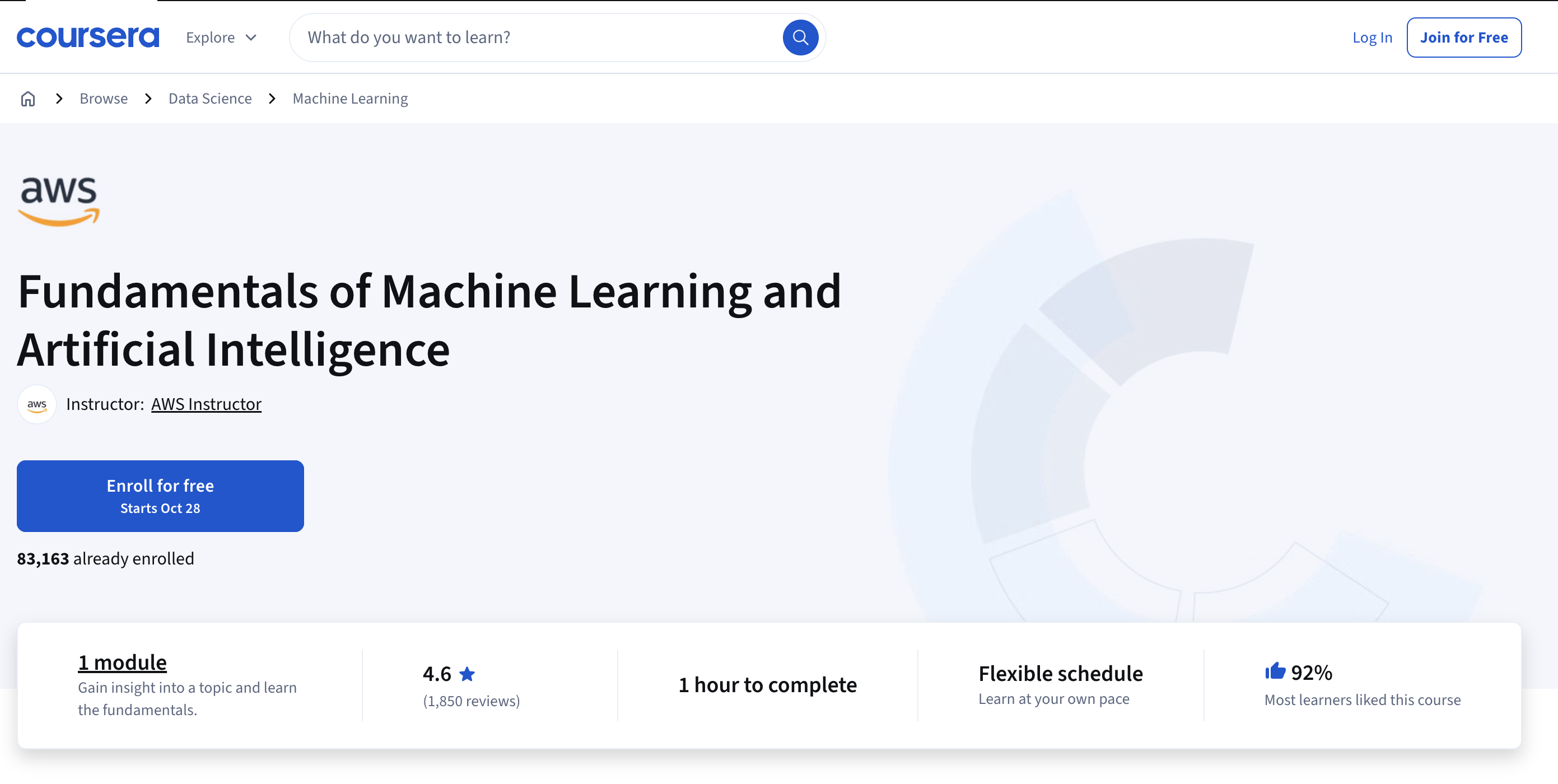
Foundational AI/ML course by AWS covering terminology, algorithms, and cloud ML services
- Platform: Coursera
- Provider: Amazon Web Services (AWS)
- Difficulty Level: Beginner / Foundational
- Format: Self-paced online course; 1 module; 1 assignment; taught in English; flexible schedule
- Duration: ~1 hour
- Certificate: Audit free; optional certificate available (paid)
“Fundamentals of Machine Learning and Artificial Intelligence” by AWS explains the foundations of AI and ML, the relationships between AI, machine learning, deep learning, and generative AI, and where these techniques are applied. You’ll learn core terminology and survey common machine learning algorithms and neural networks at a high level. The course also highlights selected AWS services that provide AI/ML capabilities and shows how they can be used to solve practical problems across industries. Skills covered include AI/ML fundamentals, generative AI, artificial neural networks, data analysis, and machine learning algorithms. Instruction is delivered by an AWS instructor.
20. Introduction to Machine Learning by Duke University
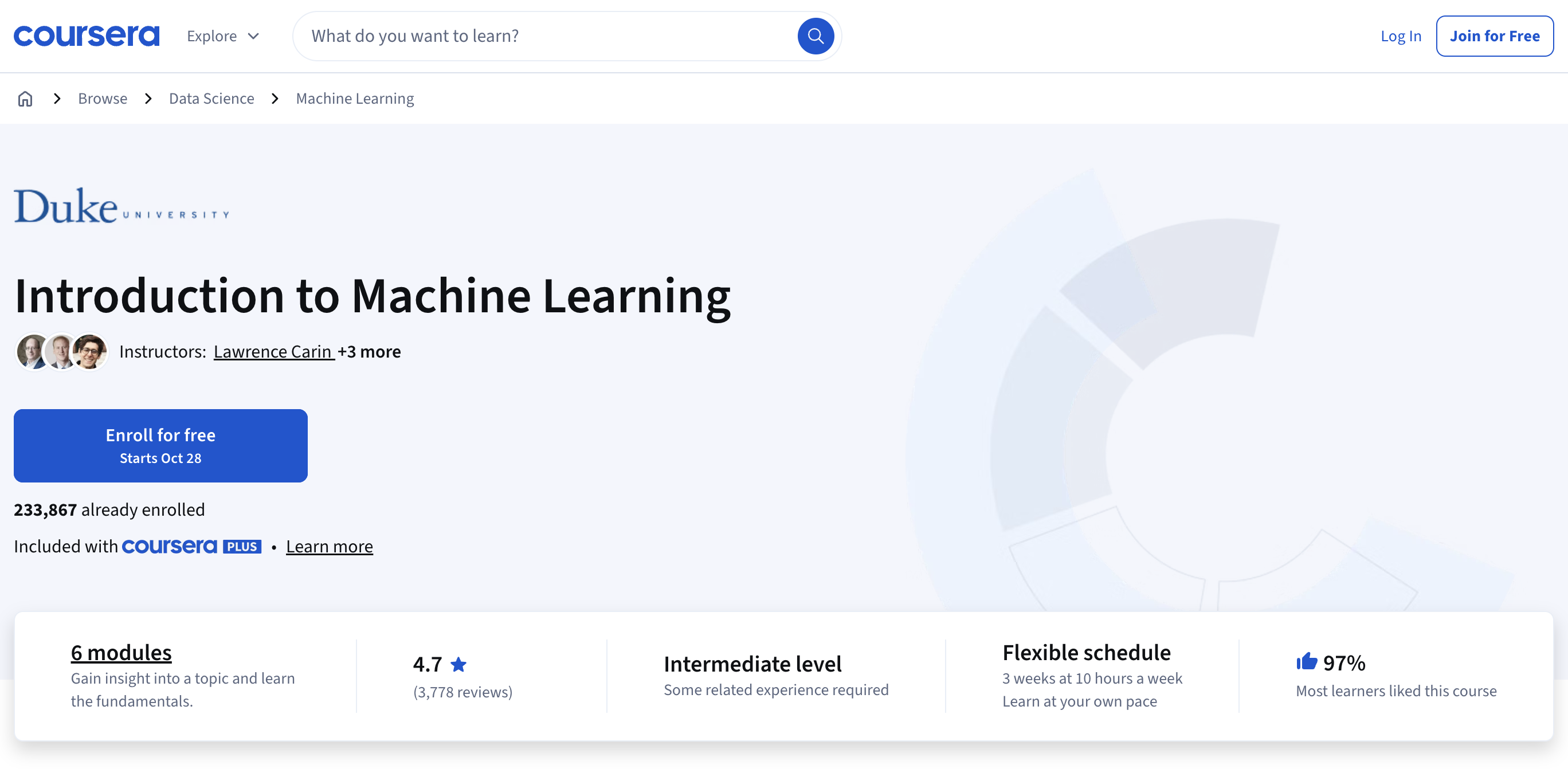
Hands-on ML course by Duke University with PyTorch for medical diagnostics and computer vision
- Platform: Coursera
- Provider: Duke University
- Difficulty Level: Intermediate (some related experience required)
- Format: Self-paced online course; 6 modules; 24 assignments; hands-on practice in PyTorch; taught in English; flexible schedule
- Duration: ~3 weeks (≈10 hours/week)
- Certificate: Audit free; optional certificate available (paid)
“Introduction to Machine Learning” by Duke University introduces core machine learning models and where they are useful, covering logistic regression, multilayer perceptrons, convolutional neural networks, and basic natural language processing. Learners practice implementing models on real datasets with PyTorch, with applications spanning medical diagnostics, image recognition, and text prediction. Skills developed include supervised learning, neural networks, reinforcement learning fundamentals, computer vision, data validation, and applied ML. Instructors are Lawrence Carin, David Carlson, and Timothy Dunn from Duke University.
Conclusion
Learning machine learning doesn’t have to be expensive. With so many high-quality courses available for free or free-to-audit, you can build a solid foundation without spending a cent.
The key to free online learning is consistency and practice. Pick one course that matches your current level, stick with it, and apply what you learn through projects. Over time, you’ll gain the understanding of the core machine learning concepts and develop the practical skills.
Frequently Asked Questions
Most courses require basic Python knowledge. If you’re new to programming, start with Microsoft ML for Beginners or Google ML Crash Course, which include gentler introductions. For intensive programming preparation, consider pairing ML study with foundational Python courses.
Start with Google Machine Learning Crash Course, Microsoft ML for Beginners, or Fast.ai Practical Deep Learning for Coders. These courses teach ML concepts with minimal math prerequisites. Once you’re comfortable, you can take the Mathematics for ML Specialization to deepen your understanding.
Absolutely! All courses listed offer free access to materials. Certificates are optional and mainly useful for LinkedIn/resume credentials. Your portfolio projects (especially from ML Zoomcamp or FreeCodeCamp) will be more valuable to employers than certificates.
For basic competency: 2-3 months with consistent study. For job readiness: 4-6 months including projects. For advanced expertise: 1-2 years of continuous learning and practice. Start with one course (like ML Zoomcamp or DeepLearning.AI Specialization) and build from there.
Generally no. Focus on one primary course and one supplementary resource (like Kaggle for practice). Exception: You can pair a math course (Imperial College) with a practical course if you need math foundations.
Machine Learning is a subset of AI focused on algorithms that learn from data. These ML courses teach core algorithms (regression, neural networks, decision trees). For broader AI topics including agents, LLMs, and automation, check out our AI Dev Tools Zoomcamp.
Most free courses don’t offer formal placement services, but ML Zoomcamp includes an active Slack community where members share job opportunities, and the capstone project creates a strong portfolio piece. Focus on building projects and networking within course communities.
University OpenCourseWare (MIT 6.036, Stanford CS229, etc.) don’t offer credit, but platforms like Coursera and edX sometimes offer credit-eligible versions for a fee. Check each platform’s credit policies if this is important to you.